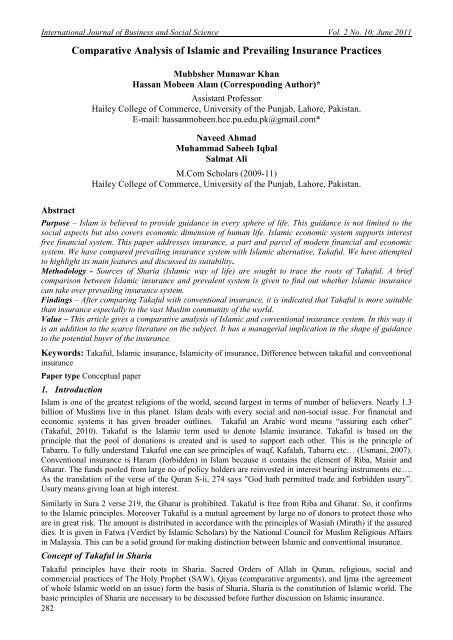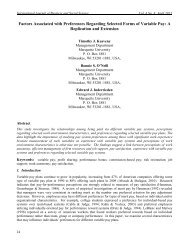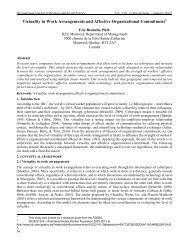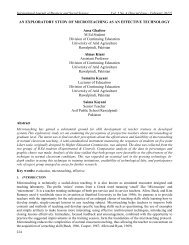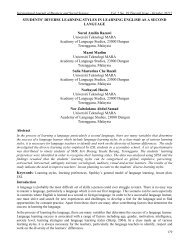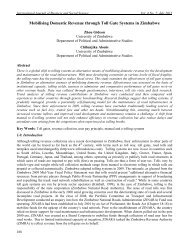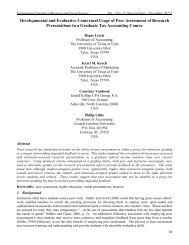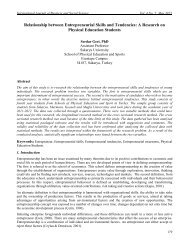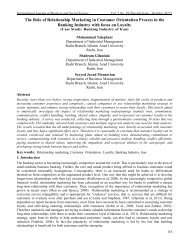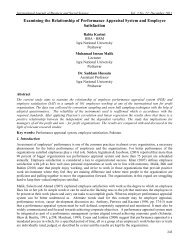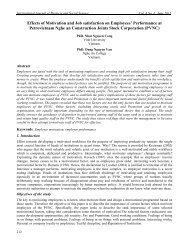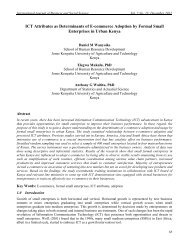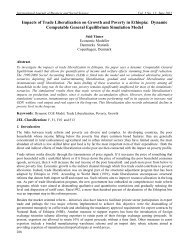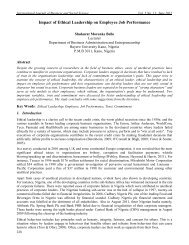Mubbsher Munawar Khan - International Journal of Business and ...
Mubbsher Munawar Khan - International Journal of Business and ...
Mubbsher Munawar Khan - International Journal of Business and ...
You also want an ePaper? Increase the reach of your titles
YUMPU automatically turns print PDFs into web optimized ePapers that Google loves.
<strong>International</strong> <strong>Journal</strong> <strong>of</strong> <strong>Business</strong> <strong>and</strong> Social Science Vol. 2 No. 10; June 2011<br />
Abstract<br />
Comparative Analysis <strong>of</strong> Islamic <strong>and</strong> Prevailing Insurance Practices<br />
<strong>Mubbsher</strong> <strong>Munawar</strong> <strong>Khan</strong><br />
Hassan Mobeen Alam (Corresponding Author)*<br />
Assistant Pr<strong>of</strong>essor<br />
Hailey College <strong>of</strong> Commerce, University <strong>of</strong> the Punjab, Lahore, Pakistan.<br />
E-mail: hassanmobeen.hcc.pu.edu.pk@gmail.com*<br />
Naveed Ahmad<br />
Muhammad Sabeeh Iqbal<br />
Salmat Ali<br />
M.Com Scholars (2009-11)<br />
Hailey College <strong>of</strong> Commerce, University <strong>of</strong> the Punjab, Lahore, Pakistan.<br />
Purpose – Islam is believed to provide guidance in every sphere <strong>of</strong> life. This guidance is not limited to the<br />
social aspects but also covers economic dimension <strong>of</strong> human life. Islamic economic system supports interest<br />
free financial system. This paper addresses insurance, a part <strong>and</strong> parcel <strong>of</strong> modern financial <strong>and</strong> economic<br />
system. We have compared prevailing insurance system with Islamic alternative, Takaful. We have attempted<br />
to highlight its main features <strong>and</strong> discussed its suitability.<br />
Methodology - Sources <strong>of</strong> Sharia (Islamic way <strong>of</strong> life) are sought to trace the roots <strong>of</strong> Takaful. A brief<br />
comparison between Islamic insurance <strong>and</strong> prevalent system is given to find out whether Islamic insurance<br />
can take over prevailing insurance system.<br />
Findings – After comparing Takaful with conventional insurance, it is indicated that Takaful is more suitable<br />
than insurance especially to the vast Muslim community <strong>of</strong> the world.<br />
Value – This article gives a comparative analysis <strong>of</strong> Islamic <strong>and</strong> conventional insurance system. In this way it<br />
is an addition to the scarce literature on the subject. It has a managerial implication in the shape <strong>of</strong> guidance<br />
to the potential buyer <strong>of</strong> the insurance.<br />
Keywords: Takaful, Islamic insurance, Islamicity <strong>of</strong> insurance, Difference between takaful <strong>and</strong> conventional<br />
insurance<br />
Paper type Conceptual paper<br />
1. Introduction<br />
Islam is one <strong>of</strong> the greatest religions <strong>of</strong> the world, second largest in terms <strong>of</strong> number <strong>of</strong> believers. Nearly 1.3<br />
billion <strong>of</strong> Muslims live in this planet. Islam deals with every social <strong>and</strong> non-social issue. For financial <strong>and</strong><br />
economic systems it has given broader outlines. Takaful an Arabic word means “assuring each other”<br />
(Takaful, 2010). Takaful is the Islamic term used to denote Islamic insurance. Takaful is based on the<br />
principle that the pool <strong>of</strong> donations is created <strong>and</strong> is used to support each other. This is the principle <strong>of</strong><br />
Tabarru. To fully underst<strong>and</strong> Takaful one can see principles <strong>of</strong> waqf, Kafalah, Tabarru etc… (Usmani, 2007).<br />
Conventional insurance is Haram (forbidden) in Islam because it contains the element <strong>of</strong> Riba, Maisir <strong>and</strong><br />
Gharar. The funds pooled from large no <strong>of</strong> policy holders are reinvested in interest bearing instruments etc….<br />
As the translation <strong>of</strong> the verse <strong>of</strong> the Quran S-ii, 274 says "God hath permitted trade <strong>and</strong> forbidden usury”.<br />
Usury means giving loan at high interest.<br />
Similarly in Sura 2 verse 219, the Gharar is prohibited. Takaful is free from Riba <strong>and</strong> Gharar. So, it confirms<br />
to the Islamic principles. Moreover Takaful is a mutual agreement by large no <strong>of</strong> donors to protect those who<br />
are in great risk. The amount is distributed in accordance with the principles <strong>of</strong> Wasiah (Mirath) if the assured<br />
dies. It is given in Fatwa (Verdict by Islamic Scholars) by the National Council for Muslim Religious Affairs<br />
in Malaysia. This can be a solid ground for making distinction between Islamic <strong>and</strong> conventional insurance.<br />
Concept <strong>of</strong> Takaful in Sharia<br />
Takaful principles have their roots in Sharia. Sacred Orders <strong>of</strong> Allah in Quran, religious, social <strong>and</strong><br />
commercial practices <strong>of</strong> The Holy Prophet (SAW), Qiyas (comparative arguments), <strong>and</strong> Ijma (the agreement<br />
<strong>of</strong> whole Islamic world on an issue) form the basis <strong>of</strong> Sharia. Sharia is the constitution <strong>of</strong> Islamic world. The<br />
basic principles <strong>of</strong> Sharia are necessary to be discussed before further discussion on Islamic insurance.<br />
282
© Centre for Promoting Ideas, USA www.ijbssnet.com<br />
Takaful is an Islamic contract therefore requires acceptance <strong>of</strong> <strong>of</strong>fer (Mohammad, 1988). The contract <strong>of</strong><br />
Mudarabah (Islamic way <strong>of</strong> partnership) forms the basis <strong>of</strong> Takaful. In ancient Arab takaful was found in<br />
system <strong>of</strong> “Aaqilah” involve mutual assistance arrangement. As in takaful loss is covered by many people so<br />
this system is allowed in Islam. In Takaful policy holders share a specific percentage <strong>of</strong> pr<strong>of</strong>it <strong>and</strong> also pay a<br />
sum <strong>of</strong> money to assist or indemnify each other. Basis <strong>of</strong> takafal can be traced down in Sunnah <strong>of</strong> The Holy<br />
Prophet (SAW) <strong>and</strong> Sunnah <strong>of</strong> Companions. Then we find operational improvements in fourteenth to<br />
seventeenth century; in nineteenth century; <strong>and</strong> twentieth century (Billah, 1998). Takaful is originated from<br />
the Sharia principles especially those <strong>of</strong> Muamlatt (transactions between men) <strong>and</strong> purely is in compliance<br />
with the teachings <strong>of</strong> Islamic Sharia (Mohammad, 1988).<br />
Models Governing Takaful<br />
There are Mudarabah, Waqalah, <strong>and</strong> Waqf models <strong>of</strong> takaful. In Mudarabah model one person invests money<br />
seeking efforts from mudaharib. The pr<strong>of</strong>it sharing is based on the rate at which Sharia committee agrees. The<br />
participants are the money investors <strong>and</strong> takaful operators are mudaharibs (Takaful, 2007). In Waqalah model<br />
there is a distinction between effort making company <strong>and</strong> the participants. The efforts maker gets their salaries<br />
from the contribution <strong>of</strong> the participant <strong>and</strong> pr<strong>of</strong>its made by investing funds <strong>of</strong> takaful. The fees provided to<br />
operators for their efforts are set by Sharia committee which ensures compliance <strong>of</strong> company’s policies with<br />
Sharia (Takaful, 2007). On the other h<strong>and</strong> in Waqf model the donors donate money to the assured in need. In<br />
this way company works as a Governmental foundation not for pr<strong>of</strong>it. Unlike in Mudarabah <strong>and</strong> Waqalah<br />
models the funds in this model are not in the ownership <strong>of</strong> anybody. Mufti Mohammad Taqi Usmani (famous<br />
Islamic scholar) likes Waqf model the most <strong>and</strong> believes it as purely Islamic (Takaful, 2007).<br />
2. Why Islamic Sharia Prohibits Conventional Insurance?<br />
An opinion was sought from a religious scholar Syed Ibn-Abdin about insurance related to sea. In his opinion<br />
it is not according to Islamic Sharia that a trader pays amount <strong>of</strong> premium to insurance company so that he<br />
may be indemnified (Mankabady, 1989). Conventional insurance include Riba, Maisir, <strong>and</strong> Gharar which are<br />
against Islamic Sharia. Riba is used in Arabic language which means excess or addition in something. In Islam<br />
loan without interest is allowed <strong>and</strong> if interest is charged then it is Haram <strong>and</strong> against Sharia however service<br />
charges are allowed (Mahmood, 1991). It is narrated by Hazrat Jabir (R.A),”The Holy Prophet (SAW) cursed<br />
the devourer <strong>of</strong> usury, its payer, its scribe <strong>and</strong> its two witnesses <strong>and</strong> they were equal (in sin)” (Karim).<br />
Gharar is uncertainty in a contract in which one party is in benefit <strong>and</strong> loss is beard by other party. Gharar<br />
may be in case <strong>of</strong> any insurance contract in which there is no idea about payment as promised or there is no<br />
idea about how much amount should be paid at the time <strong>of</strong> its payment. Maisir in insurance is in which policy<br />
holders invest small amount premium with hope to gain large pr<strong>of</strong>it <strong>and</strong> some time due to losses they lose<br />
their premium invested <strong>and</strong> claims may be higher than contributions. Maisir refers to obtaining or acquiring<br />
something without any effort. This is done in gambling (Mohammad, 1988). In Holy Quran Allah has clearly<br />
declared Maisir (gambling) unlawful <strong>and</strong> there is no relaxation in it (Quran, 627 A.D). About 200 scholars<br />
participated in a conference in Makkah <strong>and</strong> concluded that insurance practiced in conventional insurance<br />
companies is against Sharia ( First international conference on Islamic economics, 1976). In this<br />
conference it was also concluded that Islamic insurance system is different from conventional insurance<br />
system <strong>and</strong> is according to Sharia. Council <strong>of</strong> Islamic Ideology <strong>of</strong> Pakistan in 1983 rejected all the models <strong>of</strong><br />
commercial insurance.<br />
3. Differences in Takaful <strong>and</strong> Conventional Insurance<br />
Takaful operate in such a way that the participants contribute their money <strong>and</strong> formulate a pool <strong>of</strong> money.<br />
This money is then invested to earn Halal pr<strong>of</strong>it in sharia compliant investments. The amount <strong>of</strong> pr<strong>of</strong>it earned<br />
is then added in money pool <strong>and</strong> is then distributed among the participants after satisfying any claim as a<br />
renewal discount. The takaful operator only receives Wakala fee.<br />
Takaful Operations (Takaful <strong>and</strong> conventional insurance compared, 2009).<br />
283
<strong>International</strong> <strong>Journal</strong> <strong>of</strong> <strong>Business</strong> <strong>and</strong> Social Science Vol. 2 No. 10; June 2011<br />
Conventional insurance operates in such a way that premium is paid by policy holders to insurance company<br />
<strong>and</strong> then this amount is invested by insurance company in interest bearing or non sharia compliant investing<br />
areas. Amount <strong>of</strong> interest <strong>and</strong> pr<strong>of</strong>it is received by insurance companies <strong>and</strong> then surplus is retained in the<br />
company without distributing it among policy holder <strong>and</strong> only claims are met with this surplus.<br />
Conventional Insurance operations (Takaful <strong>and</strong> conventional insurance compared, 2009)<br />
Islamic insurance companies invest in a number <strong>of</strong> Sharia compliant products. Governments <strong>of</strong> the countries<br />
in which Muslims are in majority have introduced a legal framework which helps in introduction <strong>of</strong> new<br />
Sharia compliant products. Mudaraba certificates are the instruments which are evolved from such legal<br />
framework. While a conventional insurance company invests in interest based instruments like treasury bills,<br />
certificates <strong>of</strong> deposits, interest bearing bonds etc....Table 3.0 shows some <strong>of</strong> the Islamic <strong>and</strong> non-Islamic<br />
instruments that attract the investments <strong>of</strong> Islamic insurance companies <strong>and</strong> conventional insurance companies<br />
(Hakim, 2007).<br />
The present form <strong>of</strong> conventional insurance is Haraam <strong>and</strong> Takaful is according to Islamic Sharia is fully<br />
permissible because conventional insurance has elements <strong>of</strong> interest, gharar <strong>and</strong> gambling <strong>and</strong> takaful has not<br />
such type <strong>of</strong> elements as explained above (Islamic conference in jeddah , 1985). Insurance includes pure risk<br />
<strong>and</strong> speculative risk. In pure risk loss may occur or not while in speculative risk there may be loss, pr<strong>of</strong>it or no<br />
loss. Takaful applies the indemnification principle <strong>and</strong> compensate the loss <strong>of</strong> Takaful client. Takaful is only<br />
related with pure risk <strong>and</strong> not with speculative risk.<br />
The goal <strong>of</strong> insurance is to maximize pr<strong>of</strong>it in favor <strong>of</strong> shareholders because they are stock companies <strong>and</strong><br />
ignore client while in contrast takaful goal is well-being <strong>and</strong> self sustaining operation without earning high<br />
pr<strong>of</strong>it. In Takaful surplus is shared between shareholders <strong>and</strong> policy holder <strong>and</strong> also surplus is owned by<br />
participants <strong>and</strong> is reduced by performance fee for operators before dividing in to participant (Wakala model).<br />
Takaful helps people to accumulate their saving for goodness <strong>of</strong> whole community. An opportunity is<br />
provided by takaful scheme to people to practice Islamic way. The Holy Prophet (PBUH) saying is “whosever<br />
removes the hardship from believer, Allah will remove hardship from him one <strong>of</strong> the hardship <strong>of</strong> the Day <strong>of</strong><br />
Judgment” (Sahih Muslim ). Insurance is vice versa. Al tabarue is account in takaful which involves donations<br />
<strong>and</strong> it also involves al Mudarabah principles. While in conventional insurance general insurance <strong>and</strong> life<br />
insurance accounts are involved. In Takaful pr<strong>of</strong>it is divided between different participants in specific ratios<br />
on the basis <strong>of</strong> Al-Mudarabah principles. While in conventional insurance pr<strong>of</strong>it is not shared between<br />
members in a specific ratio <strong>and</strong> in some year bonus is provided <strong>and</strong> some time not.<br />
Takaful fund is managed by operator but ownership is <strong>of</strong> participants. They have a complete right <strong>of</strong><br />
contribution <strong>and</strong> benefits. In conventional insurance the policy holder purchase policy <strong>and</strong> there exist seller –<br />
purchaser relationship. Takaful company performs trustee <strong>and</strong> operator functions. In conventional insurance<br />
there exist one to one relationship between policy holder <strong>and</strong> company. Different elements like Riba, Gharar<br />
<strong>and</strong> Gambling are not involved in takaful <strong>and</strong> it is according to Islamic Sharia. Riba <strong>and</strong> Gharar are involved<br />
in conventional insurance system <strong>and</strong> do not fulfill sharia requirements <strong>and</strong> therefore it is not allowed<br />
(Haberbeck, 1987). Sharia Council determines where to invest funds so that interest factor may not involve<br />
while in conventional insurance funds are invested without guideline <strong>of</strong> Sharia Council usually in interest<br />
based businesses. Takaful operates on mutual assistance principle. Conventional insurance operate on<br />
business principle.<br />
284
© Centre for Promoting Ideas, USA www.ijbssnet.com<br />
In insurance contract there is clause that insurer can forfeit the premium amount that is paid by the policy<br />
holders under certain circumstances. Islam does not allow the forfeiture <strong>of</strong> premium, wholly or partly, as the<br />
amount <strong>of</strong> premium is consider as loan by insured to insurer. In takaful there is no forfeiture <strong>of</strong> contributions<br />
<strong>and</strong> it is distributed among the participant in form <strong>of</strong> surplus (Mahmood D. N., 1991). Rules are made<br />
according to Holy Quran <strong>and</strong> Hadith in takaful system. In conventional insurance system rules are made<br />
according to human mind <strong>and</strong> thinking. All participants contribute fixed amount in Takaful .In conventional<br />
insurance amount <strong>of</strong> paid premium vary from one policy holder to others. In takaful the participant can<br />
receive all the benefit on the maturity <strong>of</strong> contract but if he died before maturity then amount is paid to the<br />
claimant without investigation <strong>and</strong> without letter <strong>of</strong> administration. The claimant is entitled to receive same<br />
benefits as it is to be paid to the participant on maturity <strong>and</strong> there is no deduction (Mahmood D. N., 1991). In<br />
conventional insurance if the policy holder is died then amount is not paid to the claimant without proper<br />
investigation <strong>of</strong> causes <strong>of</strong> death.<br />
In Islamic insurance the agent (wakil) gets the salary for his services while in conventional insurance agent<br />
gets specific percentage from the amount paid by policy taker. In Islamic insurance agent is considered as<br />
employee <strong>of</strong> the takaful operator <strong>and</strong> only gets salaries for his services. In conventional life insurance the<br />
persons (not necessarily the heirs) can have the insurable interest <strong>of</strong> the policy holder whereas in Islamic life<br />
insurance the insurable interest is vested according to wasiyah principle (Billah, 1997).<br />
Quran, Hadith <strong>and</strong> Fatwas Regarding Conventional Insurance<br />
All kinds <strong>of</strong> insurance according Islamic Sharia is Haram <strong>and</strong> prohibited by The Holy Quran because it<br />
includes gharar <strong>and</strong> gambling. No doubt interest factors are included in every type <strong>of</strong> insurance which are<br />
riba-ul-nasiah <strong>and</strong> riba-ul-fadl <strong>and</strong> are prohibited in Islam (Noorzoy, 1982). God has prohibited gambling<br />
saying “O ye who believe! Strong drink <strong>and</strong> game <strong>of</strong> chance <strong>and</strong> idols <strong>and</strong> divining arrows are only an infamy<br />
<strong>of</strong> Satan’s h<strong>and</strong>iwork. Leave it a side in order to succeed” (Al-Ma'ida, 627 A.D). Gharar is included in all type<br />
<strong>of</strong> conventional insurance. Therefore Islam prohibits all type <strong>of</strong> conventional insurance as “O ye who believe!<br />
Eat not up your property among yourself in vanities” (Al Nisa). The Holy Prophet says, “Do not buy fish in<br />
the sea, for it is gharar” (Hanbal).<br />
Ulamas (religious scholars) gave fatwas related to insurance. Hanfi (a religious school <strong>of</strong> thought) scholars<br />
considered that co-operative insurance is legal while other types <strong>of</strong> insurance are illegal because it includes<br />
the elements <strong>of</strong> riba <strong>and</strong> gharar. According to Maliki’s (another school <strong>of</strong> thought) contract <strong>of</strong> life insurance is<br />
illegal while other insurance contracts are legal. Shafi’s agree with Maliki’s but in other contract <strong>of</strong> insurance<br />
they think are as well. According to the Hanbalis (a religious school <strong>of</strong> thought) contract <strong>of</strong> insurance is illegal<br />
(Mankabady, Insurance <strong>and</strong> Islamic Law, 1989). The contract <strong>of</strong> commercial insurance involves the element<br />
<strong>of</strong> risk which makes the contract void <strong>and</strong> therefore not allowed in Islam while the contract <strong>of</strong> mutual<br />
assistance (takaful) fulfill the sharia principles <strong>and</strong> is allowed. The pure Islamic nature <strong>of</strong> Takaful gets a solid<br />
support from Ulama’s Fatwa. In Feb. 16, 2006 takaful approval was signed by Justice Taqi Usmani <strong>and</strong> other<br />
religious Ulama <strong>of</strong> Pakistan.<br />
Conclusion<br />
Britain is a Muslim minority country. A nationwide study in Britain revealed that 74% <strong>of</strong> Muslim participants<br />
considered their religion were very important in living their lives, <strong>and</strong> 21% considered it fairly important.<br />
Moreover, around 80% declared to visit mosque once or more than once in a week (Modood, et al., 1997).<br />
Muslims represent a large portion <strong>of</strong> world population <strong>and</strong> are increasing at a greater pace than other religious<br />
communities. Muslims are 20% <strong>of</strong> the world population <strong>and</strong> are expected to be 30% by 2025 (Shafie &<br />
Othman, 2006). Fifty seven Islamic countries are regular members <strong>of</strong> the Organization <strong>of</strong> Islamic<br />
Conference’s (OIC).<br />
The Muslims all around the world wish to go side by side with modern commerce. They are not willing to<br />
follow non- Islamic practices. They are looking for Islamic alternatives to prevailing financial instruments <strong>and</strong><br />
practices. Islamic banking is a great success not only in Muslim majority but also in Muslim minority<br />
countries. Major international banks are today <strong>of</strong>fering Sharia compliant products. In the similar manner<br />
akafal presents an Islamic alternative to insurance.<br />
The Interpretations made by Scholars provide a complete framework governing Islamic Insurance. In this<br />
article the suitability <strong>of</strong> Islamic insurance over conventional one along with its applicability in Muslim world<br />
is discussed. Ahmed (2010) reported that the Islamic principles can prohibit the global crisis to occur. Islamic<br />
insurance funds are invested in interest free securities which reduce the chances <strong>of</strong> the crisis in this industry.<br />
Resultantly it provides a solid support for Islamic insurance.<br />
285
<strong>International</strong> <strong>Journal</strong> <strong>of</strong> <strong>Business</strong> <strong>and</strong> Social Science Vol. 2 No. 10; June 2011<br />
To maintain his Homo-Islamicus behaviors a Muslim may adapt his practices to <strong>and</strong> comply with Sharia<br />
principles. The models <strong>of</strong> Takaful are helpful in categorizing it. Tawakal concept best deals with takaful<br />
because firm belief in the God is compulsory but taking due care is also necessary. Takaful <strong>and</strong> conventional<br />
insurance models are different because <strong>of</strong> their permissibility in Islam. Conventional mode is based on Riba<br />
which is prohibited in Islam.<br />
References<br />
1. Ahmed, A. (2010). Global financial crisis: an Islamic finance perspective. <strong>International</strong> <strong>Journal</strong> <strong>of</strong> Islamic <strong>and</strong><br />
Middle Eastern Finance <strong>and</strong> Management, Vol. 3 (4).<br />
2. Al-Ma'ida, S. (627 A.D). Sura Al-Ma'ida. In The Holy Quran, (pp. verses no.90,91).<br />
3. Al Nisa. In The Holy Quran (pp. verses,59).<br />
4. Banking (pp. pp. 162-164). Edward Elgar Publishing Limited.<br />
5. Billah, M. M. (1998). Islamic Insurance: Its Origins <strong>and</strong> Development. Arab Law Quarterly , Vol. 13 (4), pp.<br />
386-422.<br />
6. Billah, M. M. (1997). A Model <strong>of</strong> Life Insurance in the Contemporary Islamic Economy. Arab Law Quarterly ,<br />
Vol. 12 (3), pp. 287-306.<br />
7. First international conference on Islamic economics. (1976). Makkah.<br />
8. Hakim, S. R. (2007). Islamic money market instruments. In H<strong>and</strong>book <strong>of</strong> Islamic Banking (pp. 162-164).<br />
Edward Elgar Publishing Limited.<br />
9. Hakim, S. R. (2007). Islamic money market instruments. In H<strong>and</strong>book <strong>of</strong> Islamic Islamic conference in<br />
jeddah . (1985). jeddah.<br />
10. Haberbeck, A. ( 1987). Risk Sharing in an Islamic Society. Arab Law Quarterly , Vol. 2 (2), pp. 138-147.<br />
11. Islamic conference in Jeddah . (1985). Jeddah.<br />
12. Islamic conference in Jeddah . (1985). Jeddah.<br />
13. Islamic conference in Jeddah . (1985). Jeddah.<br />
14. Karim, A. H. Mishkat-ul-Masabih under the section <strong>of</strong> interest (Vol. vol.2).<br />
15. Mahmood, D. N. (1991). Takaful: The Islamic System <strong>of</strong> Mutual Insurance. Arab Law Quarterly , Vol. 6 (3),<br />
pp. 280-296.<br />
16. Mahmood, N. R. (1991). The Islamic System <strong>of</strong> Mutual Insurance. Arab Law Quarterly , Vol. 6 (3), pp. 280-296.<br />
17. Mankabady, S. (1989). Insurance <strong>and</strong> Islamic Law. Arab Law Quarterly , Vol. 4, (No. 3), pp. 199-205.<br />
18. Mankabady, S. ( 1989). Insurance <strong>and</strong> Islamic Law: The Islamic Insurance Company. Arab Law Quarterly ,<br />
vol. 4 (3), pp. 199-205.<br />
19. Mohammad, N. (1988). PRINCIPLES OF ISLAMIC CONTRACT LAW. <strong>Journal</strong> <strong>of</strong> Law <strong>and</strong> Religion , vol. 6<br />
(1), PP. 115-130.<br />
20. Modood, T., Berthoud, R., Lakey, J., Nazroo, J., Smith, P., Virdee, S., et al. (1997). Ethnic Minorities in<br />
Britain: Diversity <strong>and</strong> Disadvantage. London: Policy Studies Institute.<br />
21. Pktcl. (2010). Retrieved 2010, from Pak takaful company ltd: http://www.pktcl.com/en/WhatisTakaful<br />
22. Shafie, S., & Othman, M. N. (2006). Halal Certification : An <strong>International</strong> Marketing Issues <strong>and</strong> Challenges.<br />
Paper presented at the IFSAM 8th World Congress.<br />
23. Sahih Muslim . In Sahih Muslim (pp. Hadith #59 ).<br />
24. takaful. (2007). Retrieved 2011, from takaful: http://www.takaful.coop<br />
25. takaful. (2007). Retrieved 2011, from takaful: http://www.takaful.coop/doc_store/takaful<br />
26. Takaful. (2010). Retrieved 2011, from Pak-Kuwait Takaful Company Limited: http://www.pktcl.com<br />
27. Takaful. (2010). Retrieved 2011, from Pak-Kuwait Takaful Company Limited: http://<br />
www.pktcl.com/en/WhatisTakaful<br />
28. Takaful <strong>and</strong> conventional insurance compared. (2009). Retrieved 2011, from Islamic Finance Resource:<br />
http://ifresource.com<br />
29. Takaful <strong>and</strong> conventional insurance compared. (2009). Retrieved 2011, from Islamic Finance Resource:<br />
http://ifresource.com<br />
Usmani, D. M. (2007). Takaful, Dr. Muhammad Imran Usmani, SECP Takaful Conference March 14,<br />
2007. SECP Takaful Conference.<br />
286<br />
Table 3.0 Islamic <strong>and</strong> non-Islamic instruments<br />
Islamic instruments Non-Islamic instruments<br />
Mudaraba certificates Treasury bills<br />
Musharaka certificates Certificates <strong>of</strong> deposits<br />
Musharaka term finance certificates Call money market<br />
Sukuk Asset-backed securities<br />
Mudaraba inter-bank investment Negotiable certificates <strong>of</strong> deposits


